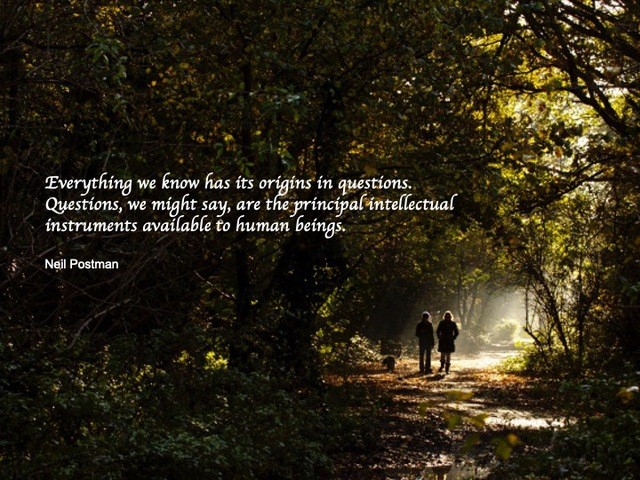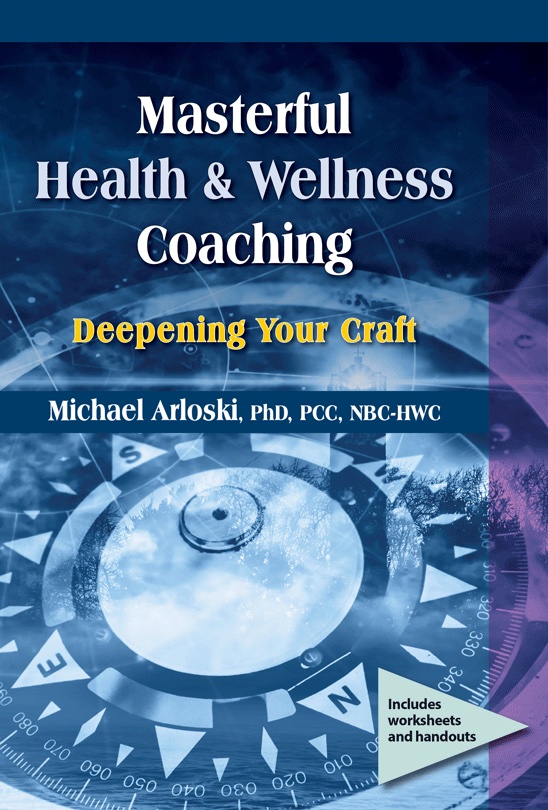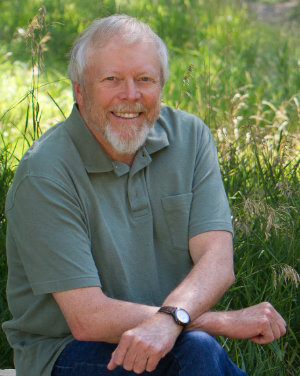The Fine Art of Coaching Questions – Part One

The Fine Art of Coaching Questions – Part On
Everything we know has its origins in questions. Questions, we might say, are the principal intellectual instruments available to human beings.
Neil Postman
Questions, like Postman says, are instruments to understanding. Perhaps they are our principal instruments, but they are not our only ones. We also come to knowing through awareness. Noticing. Mindfulness. Sensory awareness. We can also come to knowing (learning, understanding, realizations, insights) by hearing the essence of what we have just said reflected back to us (effective reflecting). Perhaps the person listening to us has a way of being with us that allows us to feel heard and understood and in that ‘safe container’ that sense of safety and acceptance allows our mind to come to a knowing we might not have otherwise reached. Perhaps that listener notices an association between a topic we are talking about and our emotional state or our nonverbal behavior and shares that observation with us. In addition to all of what we just described, perhaps our listener also is very adept at asking questions that catalyze our thinking.
Not The Only Game in Town – “Powerful” Questions
Questions, without a doubt, can do a lot of work in our coaching process. They can help our clients to:
Increase Awareness
Explore more deeply
Connect with emotion
See patterns and connections
Generate possibilities
Consider new possibilities
Gain insights
Provoke new thinking
Encourage self-reflection
Clarify values
Connect with deeper meaning
Generate energy and forward momentum
Discover and challenge assumptions
And lots more!
At first, beginning coaches are enamored with questions because of the power displayed in the list above. There is a terrific satisfaction when a question we put together for our client hits the bullseye and pays off with insight and excitement, perhaps even leading to some kind of breakthrough. We’re really helping our client!
However coaches also sweat, worrying about what is the next question I need to come up with. It’s easy to get up in our heads and discover that our level of effective listening has suffered. The pressure is on, and the coaching session can go from inquiry to something like an inquisition. I sometimes will observe a coaching session in a training and categorize each coaching response by the coach in training. In doing so I once counted seventeen questions in a row by the coach without any other coaching skills used. The coach had not even realized they had done so.
“Use two or three Active Listening Skills for every question you ask.”
William Miller

Questions are only part of the contents of an effective coach’s toolkit. I used to teach coaching students to seek a balance bewteen questions and Active Listenign Skills, but now I would say, as Bill Miller does - Use your Active Listening Skills MORE than you ask questions. Experienced and well-trained coaches discover that Reflections, Paraphrasing, Summarizations, Acknowledgements, Requests for Clarification can carry most of the Coaching Conversation. Think of your Active Listening Skills as your primary cooking ingredients, but, like a good chef, use the herbs, spices, salt and sugar of effective questions to catalyze the flavor of the dish. Now, we’re cooking!
The Progression of Questions in the Coaching Process. 
From Chapter Seven Masterful Health & Wellness Coaching: Deepening your Craft.(https://wholeperson.com/store/masterful-health-and-wellness-coaching.html)
“When the coach first meets their client, they are building the coaching alliance as they are hearing the client’s story and becoming informed about many aspects of the client’s life. Clarifying questions help the coach understand more about their client than just the information filled out in a welcome packet. At this point, many of the questions, we might say, are for the coach. My client may share with me details about their family, their health challenges and such, yielding no great insight for them, but providing me with much greater understanding of their life. If I operate from a consultant mindset (treatment, education, etc.), I may continue to ask more and more questions for me so that I can function as a good consultant—analyze the situation, determine and convey recommendations. If I have made the shift to the coaching mindset, my questioning becomes far different. Now I am using questions to help my client to explore and assess themselves. Now I am composing questions for them to ask themselves. I think of my challenge as “What is a great question that I could offer to my client right now that would help them gain greater insight and understanding?” Or, I might think “What does my client really need to be asking themselves right now?” Think of yourself as a QUESTION COMPOSER.
The Facilitative Coach’s Questions
The facilitative coach is asking themselves:
“How can I help my client to reflect upon their thinking/emotions/behavior?
How can I help them to explore more, to question, to examine?
How can I infect them with curiosity about themselves?”

Questions in the Coaching Conversation
There is a distinct difference between a Social Conversation and a Coaching Conversation. In a Social Conversation our job is to contribute to the conversation, become a part of it. In the Coaching Conversation our job is to facilitate the conversation. It’s less about us and more about them. We are coaching to facilitate the client doing their own work, helping them to explore, gain awareness and, yes, to question. Observe some of your upcoming Social Conversations and note how much the other person enquires about you, compared to how much they talk about themselves. You may find some interesting results!
When we are in the Coaching Conversation with our clients we inquire with an intention. We are looking to facilitate the processes outlined above – increasing awareness, deepening introspection, etc. Questions are serving to again, catalyze our client’s thinking.
In the cornerstone coaching book Becoming a Professional Life Coach, 3rd Edition(https://wwnorton.com/books/9781324030935) , authors Patrick Williams and Diane Menendez help us to examine the mind-set we use in our coaching with questions by drawing upon the work of Coach Mariliee Adams, who makes a useful distinction. “She said there are two mind-sets from which question develop: the judger mind-set and the learner mind-set. Judgers focus on problems, noting what is wrong, assessing issues of control, making assumptions and attempting to be right. If coaches come from the judger mind-set, they will not be effective. Learners, in contrast, focus on what is right (about themselves, the other person, and the situation), what the choices are, what can be learned, and what they are responsible for. The learner mind-set is the mind-set of the coach. The coach’s stance is to be willing to be “in the inquiry” instead of “in the answer.”(https://www.amazon.com/Becoming-Professional-Life-Coach-Whole-Person/dp/1324030933)
 Coaching Effectively with Questions – Some Good Tips
Coaching Effectively with Questions – Some Good Tips
Question Stacking
You ask your client a question and no sooner is it out of your mouth that you think of how to ask it in a better way. You refine your question; you attempt to clarify it. You ask a second question, perhaps even a third. Now, what’s your client to do? You are thinking out loud, and by stacking your questions one on top of another you are sharing that whole process with your client, perhaps confusing them.
Have confidence in your questions. See what your client does with your first question. If they need clarification they will let you know either by that quizzical expression, or by asking for it.
Want More Productive Question: Avoid Why?’s
My background as a Gestalt Therapist taught me the value of avoiding Why Questions. I found how much more productive it was to morph my Why Questions into What, How, When and Where Questions. The biggest problem with Why Questions is they can be stymying. Your client has be asking themselves over, and over again WHY? Why can’t I do this? Why do I always give up? Why is this so difficult? On and on. The Why Questions can only contribute to their stuckness.
Why Questions can also bring out defensiveness. This is especially true when combined with a negative. So why didn’t you follow through on your walking? They can feel accusatory.
Questions and Tender Territory
When the Coaching Conversation seems to be heading into emotionally tender territory always ask permission. Clients really appreciate this. Perhaps the level of trust is not there in the coaching relationship yet. By asking permission to go there the client can know that they really is okay for them to decline to go further into that direction. Would it be of value to you to explore this area some more?
Would Something Besides a Question Work Better Here?
There are times when a Request for Clarification would work better than a question. When you simply say “Tell me more about that” your client is free to respond as they need to and go in whatever direction they are already thinking and experiencing. Obviously with a question, your client will respond in the direction the question is asking.
Use the Skill of Silence can be especially helpful when your client suddenly says something powerful, like “I can’t stand this job! My boss is an idiot!” Instead of inquiring more about the job, be quiet and wait a moment. Let your client’s feelings emerge, allow them a moment to go where they need to go. Your client might surprise you and follow the statement above with a total shift in mood and energy and say “Yeah, my partner at home says that if I don’t leave this job we might break up.” Now the Coaching Conversation can really meet your client’s true needs.
At the end of the day, the questions we ask of ourselves
determine the type of people that we will become.
— Leo Babauta
More on Coaching Questions
You’ll find lots more on the fine art of Coaching Questions in Chapter Seven of my book, Masterful Health & Wellness Coaching: Deepening your Craft.(https://wholeperson.com/store/masterful-health-and-wellness-coaching.html)
Next Blog = The Fine Art of Coaching Questions – Part Two will look at the “Dark Side” of coaching questions and how to “work miracles” with them! Stay tuned and subscribe.
 Michael Arloski, Ph.D., PCC, NBC-HWC is CEO and Founder of Real Balance Health Coach Training (https://realbalance.com/). Doctor Arloski is a psychologist, coach and pioneering architect of the field of health and wellness coaching. He and his company have trained thousands of coaches around the world.
Michael Arloski, Ph.D., PCC, NBC-HWC is CEO and Founder of Real Balance Health Coach Training (https://realbalance.com/). Doctor Arloski is a psychologist, coach and pioneering architect of the field of health and wellness coaching. He and his company have trained thousands of coaches around the world.








Only registered and logged in readers can leave comments.